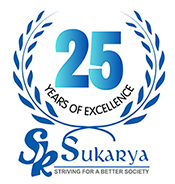Meera Satpathy
In the sprawling slums on the edges of India’s bustling cities, millions of children are caught in an inescapable cycle of poverty. For many first-generation learners, the dream of education is far from reality. Amidst these challenging conditions, Sukarya’s “Education on Wheels” (EOW) program stands as a source of hope, showcasing the transformative power of education for marginalized communities.
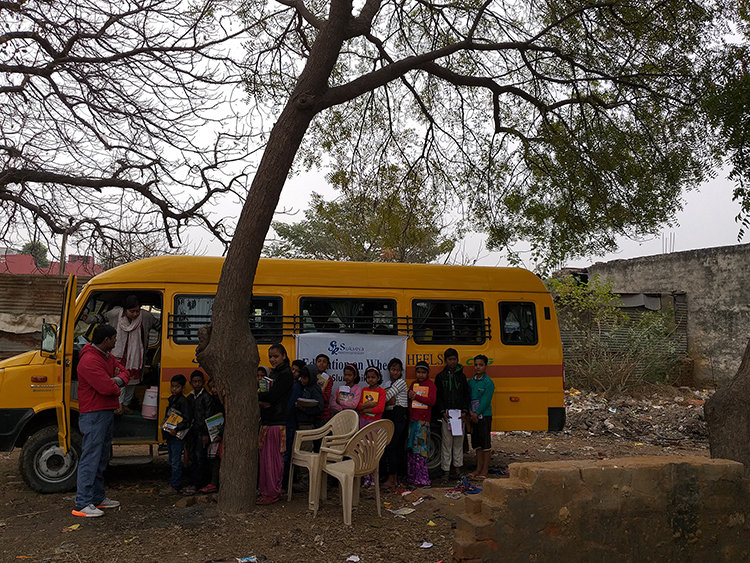
Breaking Barriers: The Alarming State of Illiteracy in India
The EOW program responds to India’s dire illiteracy state. According to a 2014 report by the National Sample Survey Office (NSSO), 32 million Indian children up to age 13 had never attended school, primarily from socially disadvantaged backgrounds. UNESCO’s 2019 Global Education Monitoring (GEM) report highlighted that 80% of migrant children in seven Indian cities lacked access to education near their worksites, leaving many vulnerable to exploitation and abuse.
The Stark Reality of Slum Living
According to UNICEF, over 100 million children worldwide live in slums, with India housing a significant portion of this population. These children face immense barriers to education, including economic instability and the necessity to work to support their families. UNESCO reports that children in slums are more likely to be out of school than their peers in stable environments.
First-Generation Learners: Facing the Odds
First-generation learners, the first in their families to attend school, face unique challenges. Without a culture of learning at home or necessary support structures, they often struggle with basic literacy and numeracy skills. The Annual Status of Education Report (ASER) reveals that over half of the children in India’s slums cannot read at a basic level.
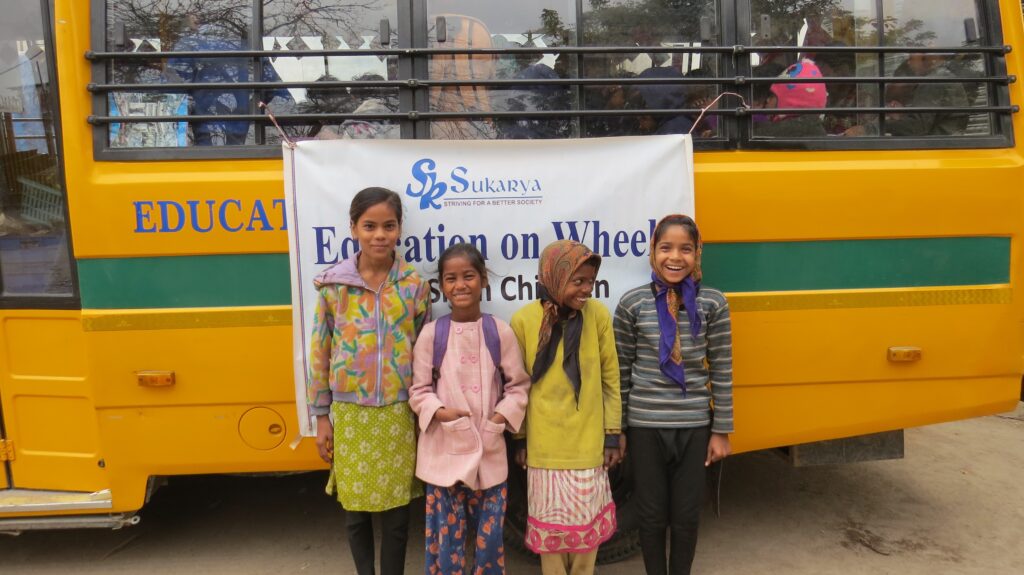
Sukarya’s Solution: Education on Wheels
Recognizing the dire need for accessible education, Sukarya launched the “Education on Wheels” program. This innovative initiative brings mobile classrooms directly to slum dwellers, offering free education to children aged 6 to 14 who would otherwise have no access to schooling. The program focuses on basic literacy, numeracy, and essential life skills, and since its inception in 2014, it has reached 3000 children across multiple slums.
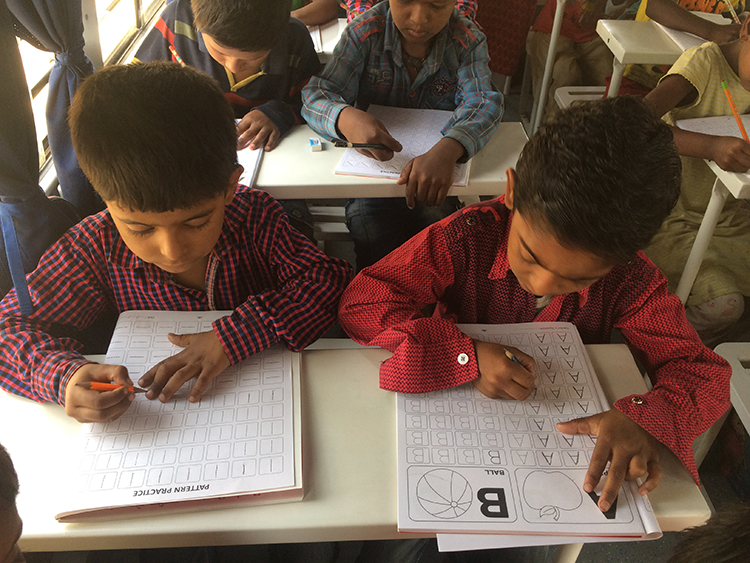
Key Features of the Program
EOW operates in the slums of Delhi and Gurugram, designed to meet children where they are, both literally and metaphorically. Mobile classrooms are equipped with learning materials, technology, and dedicated educators. Key features include:
- Innovative Teaching Methodology: Tailored non-traditional teaching styles ensure effective learning and engagement.
- Multi-grade Teaching: Students of different age groups and learning levels are taught together.
- Non-Formal Education: Remedial classes help reintegrate school dropouts and provide functional literacy to children who have never gone to school.
- Gender Equality: Ensuring at least 50% of enrolled students are girls, empowering them through education.
- Community Engagement: Monthly parent-teacher meetings and community meetings to foster community support.
- Digital Skills: Offering computer classes and essential digital skills.
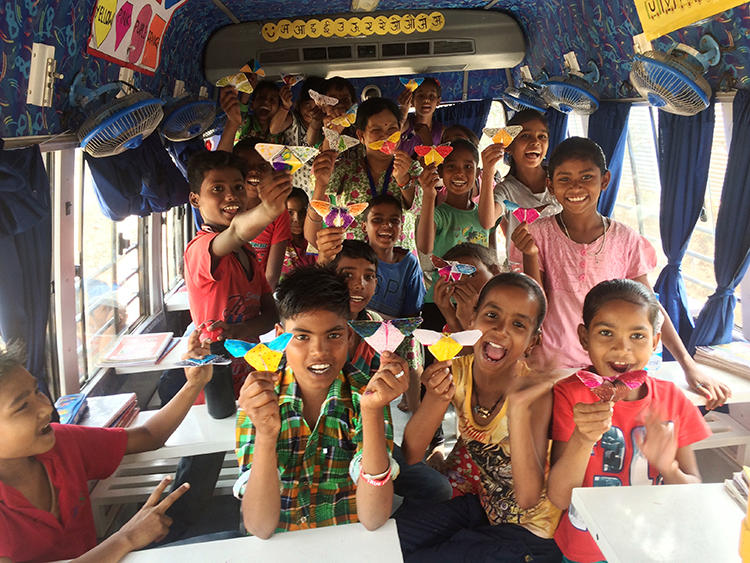
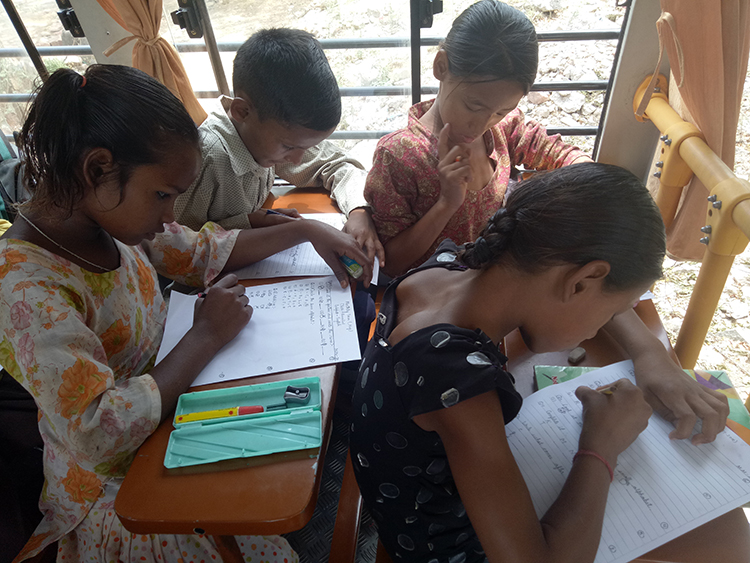
Breaking the Cycle of Poverty
Education empowers children from slums, offering a pathway out of poverty. The World Bank notes that every year of schooling increases a person’s earnings by up to 10%. Educated children contribute to the economic and social development of their communities.
Mainstreaming of Successful Children into Formal Schools
A cornerstone of the initiative is mainstreaming successful children into formal schools through the Open Basic Education (OBE) Examination administered by the National Institute of Open Schooling (NIOS). EOW sponsors selected meritorious students, providing books, stationery, transportation, and essential nutritional support.
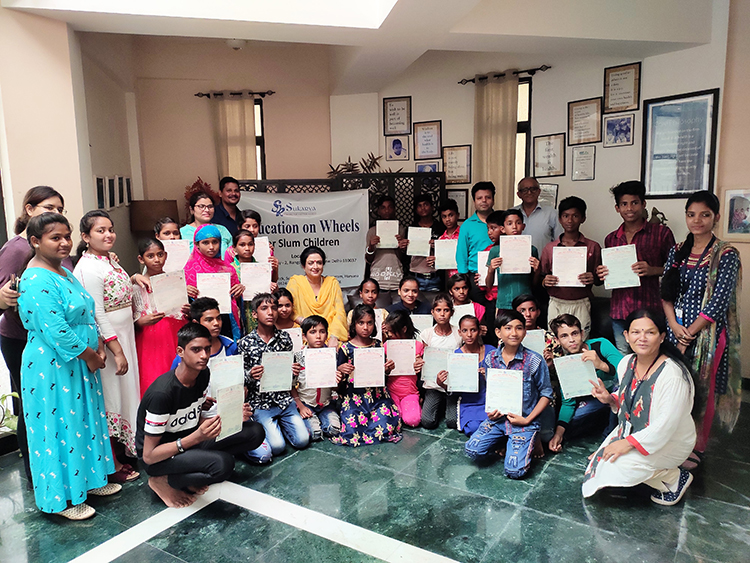
The Impact: Transforming Lives One Child at a Time
The impact of “Education on Wheels” is profound. Children who once had little hope of stepping into a classroom are now learning to read, write, and perform basic arithmetic. Since its inception, 80% of enrolled children have shown improvement in basic math and reading skills within the first year. Beyond academic learning, the program instills self-worth and confidence, empowering children to dream big and fostering a culture of learning and aspiration within communities. As a functional literacy program for slum children, it has transformed the lives of many.
Looking Ahead: Challenges and Opportunities
Despite its successes, EOW faces challenges, including scaling up to meet the vast needs of slum children across the country and ensuring the sustainability of its impact. The journey ahead is filled with opportunities for growth, innovation, and collaboration.
A Call to Action
Sukarya’s “Education on Wheels” is a powerful reminder of education’s transformative impact. It challenges us to rethink how we deliver educational opportunities to the most marginalized and commit to ensuring no child’s future is limited by their present circumstances. Let us join hands in support of this noble mission, for in the education of these children lies the key to a brighter, more equitable future for all.
Since 2014, Sukarya’s EOW program has educated 3000 children and continues to strive for more. Contact Sukarya to learn how you can support this vital initiative:
- Email: sukarya@sukarya.org
- Phone: +91-9999918517
Together, let’s keep the wheels of education turning!
This article was published in Global Washington Blog: https://globalwa.org/2024/08/wheeling-towards-hope-revolutionizing-education-for-slum-children-with-sukaryas-mobile-classrooms/
